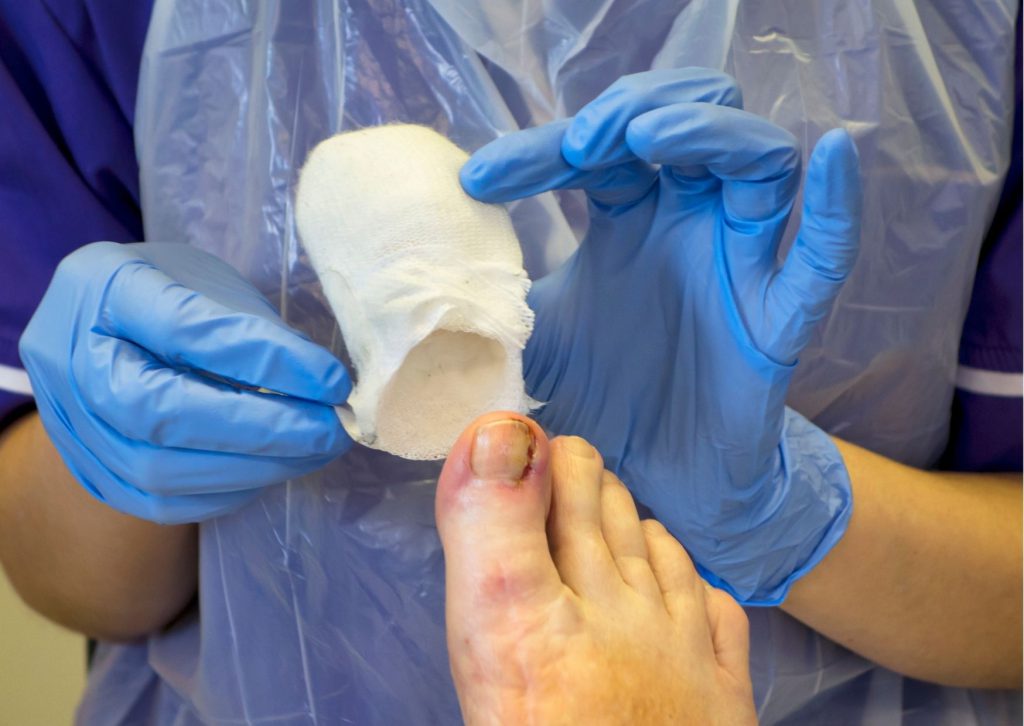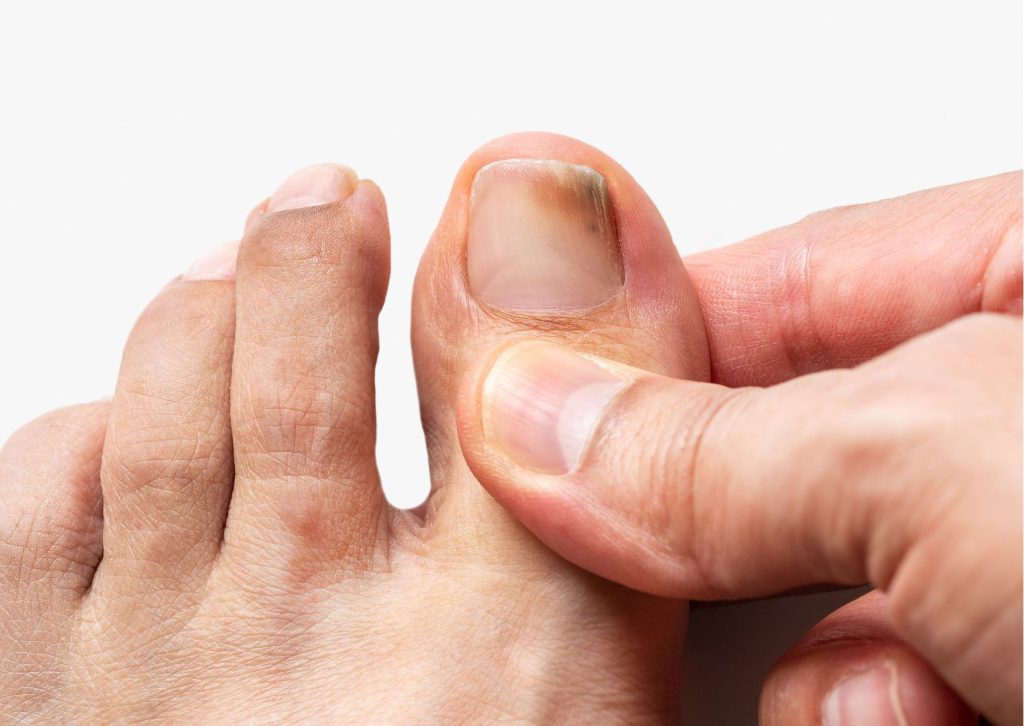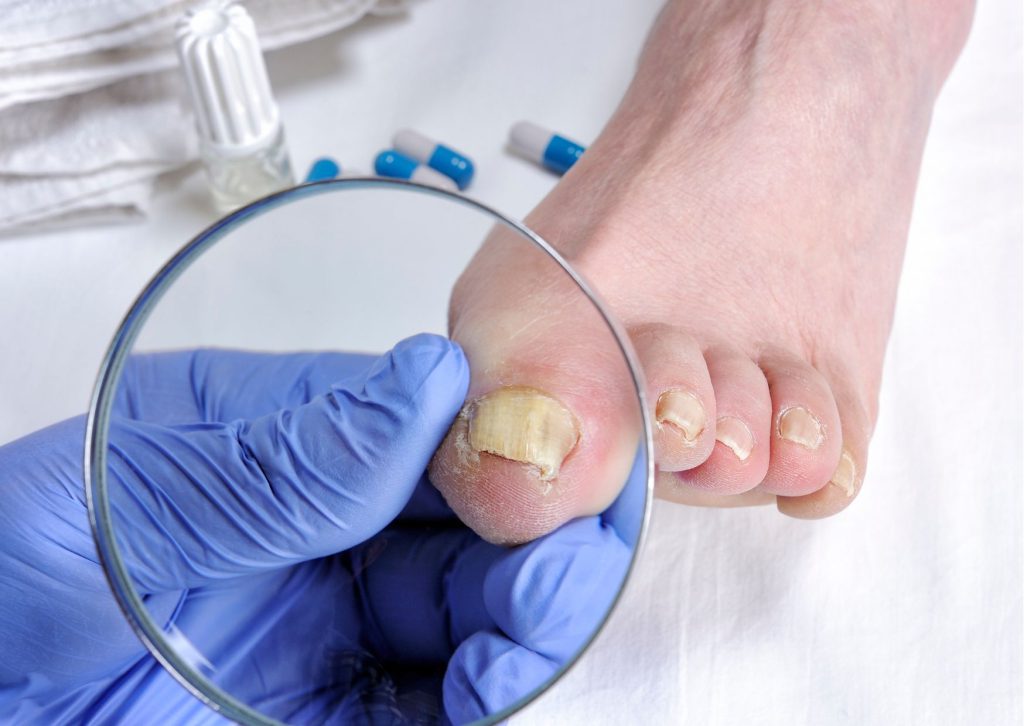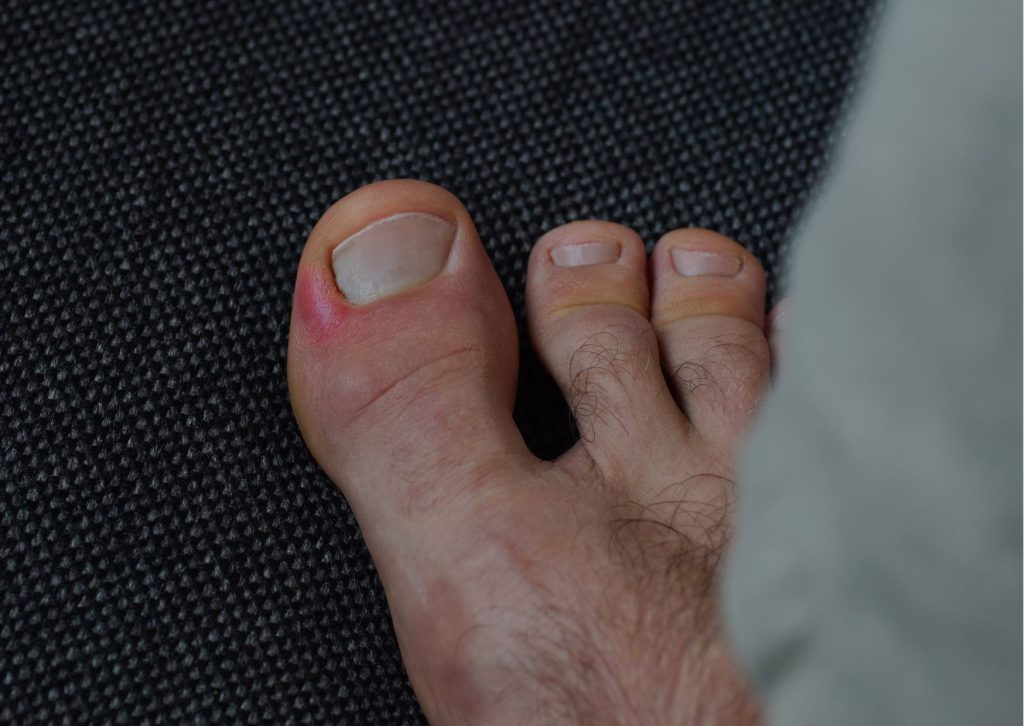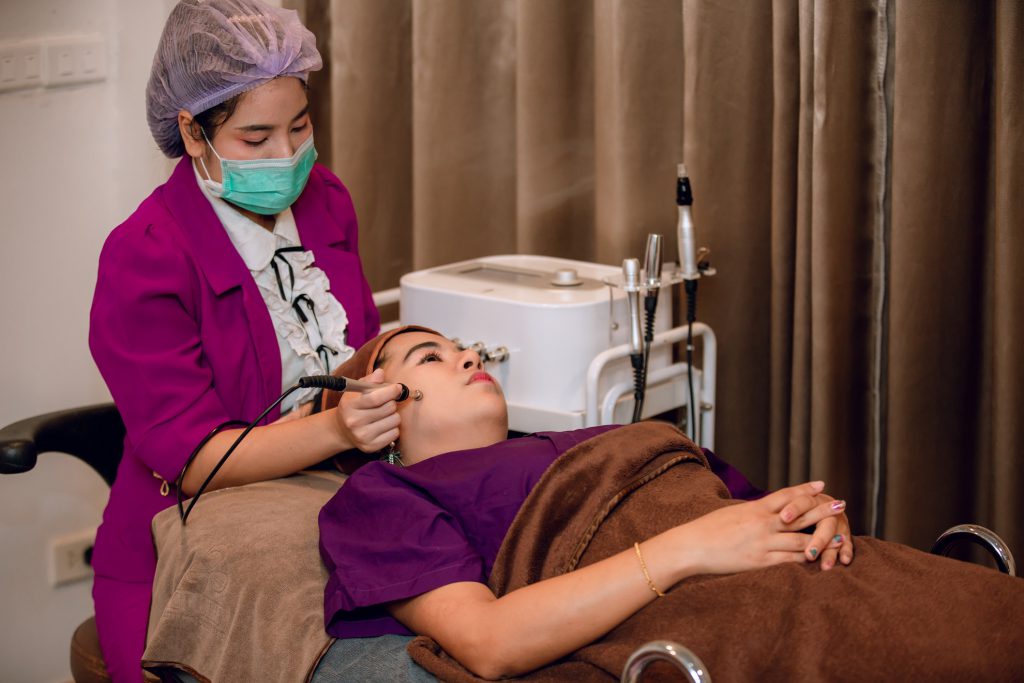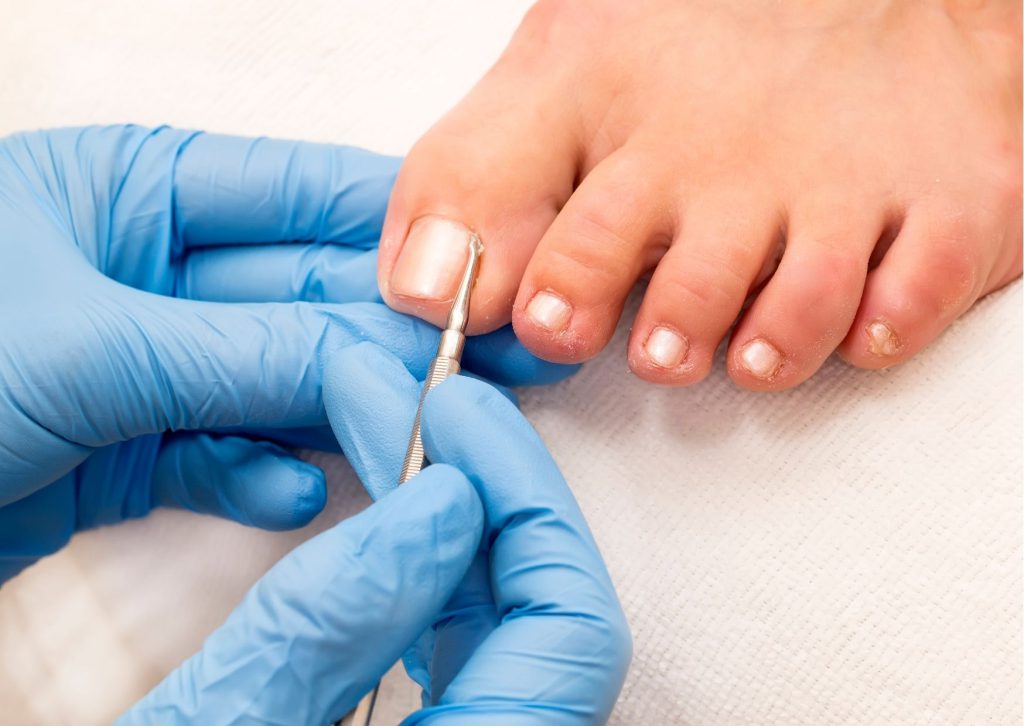Reviews the best nail treatment clinic from people in Phuket
The treatment of nail diseases must be done by a specialist doctor. If you use ordinary methods like cutting the nails, it may not be effective, and the problem may recur. Therefore, it is essential to choose a quality nail treatment clinic that uses modern treatment methods, such as surgical intervention, along with proper guidance for nail care. Our clinic uses advanced technology for nail treatment, including surgical methods, to ensure that the problem is addressed effectively. We also provide advice on how to care for your nails to prevent further complications. In addition, our clinic uses special formulas of antiseptic solutions to minimize the risk of infection and inflammation during the treatment process. If surgery is not deemed necessary, we may suggest other treatment options, such as nail removal, as a last resort. Our goal is to provide effective treatment and ensure that the problem does not recur.
Ingrown toenail disease
Ingrown toenail disease is a condition in which the edge of the toenail grows into the surrounding skin, causing pain, redness, and swelling. It is a common condition that can be caused by a variety of factors, such as
1. Improperly trimmed nails, tight-fitting shoes, injury, or genetics.
2. If left untreated, an ingrown toenail can lead to infection, abscess, or even cellulitis. Therefore, it is essential to seek medical attention as soon as possible if you suspect that you have an ingrown toenail.
3. Treatment for ingrown toenail disease usually involves the removal of the portion of the toenail that is growing into the skin. This can be done by a specialist doctor or a trained nail technician under medical supervision. In some cases, antibiotics may be prescribed if there is an infection present.
4. To prevent ingrown toenails, it is important to wear shoes that fit properly, trim toenails straight across, and avoid picking at the toenails or surrounding skin. Maintaining good hygiene by keeping feet clean and dry can also help prevent ingrown toenails.
5. If you have an ingrown toenail or suspect that you may have one, it is important to seek medical attention promptly to prevent further complications.
Infected nail disease
Infected nail disease is a condition that occurs when a nail becomes infected with bacteria, fungi, or viruses. The infection can occur in both fingernails and toenails, and can lead to pain, swelling, redness, and even pus-filled blisters.
Symptoms of fungal nails What are the symptoms?
Fungal nail infections, also known as onychomycosis, can affect both toenails and fingernails, and can cause a variety of symptoms. Common symptoms of fungal nails include:
1. Thickening of the nail The infected nail may become thicker than usual, making it difficult to trim or file.
2. Discoloration The nail may become discolored, turning yellow, brown, or white.
3. Crumbling or brittle nails The infected nail may become brittle and crumbly, making it more likely to break or split.
4. Deformed nails The infected nail may become distorted in shape or texture.
5. Foul odor The infected nail may emit a foul smell due to the presence of the fungus.
6. Separation of nail from the nail bed – In severe cases, the infected nail may become detached from the nail bed.
Fungal nail infections are typically caused by fungi that thrive in warm, moist environments such as public swimming pools, locker rooms, and showers. People with compromised immune systems, diabetes, or poor circulation are more susceptible to fungal nail infections.
If you suspect that you have a fungal nail infection, it is important to seek medical attention promptly to prevent the infection from spreading to other nails or causing further complications. Treatment for fungal nail infections may include oral or topical antifungal medications, nail removal, or laser therapy.
Curved nail disease
Curved nail disease is a condition in which the nails become abnormally curved or shaped. This can occur in both fingernails and toenails and can be caused by a variety of factors, including genetics, injury, or underlying medical conditions.
Symptoms Curved nail disease:
The symptoms of curved nail disease include:
1. Abnormally curved or shaped nails The nails may be curved upward, downward, or to the sides, and may have an irregular shape.
2. Thickening of the nails The nails may become thicker than usual, making them more difficult to trim or file.
3. Discoloration of the nails The nails may become discolored, turning yellow, brown, or white.
4. Pain or discomfort The curved nails can cause pain or discomfort, especially when pressure is applied to the affected nail.
5. Difficulty performing daily activities The curved nails can make it difficult to perform certain tasks, such as grasping objects or walking comfortably.
6. Increased risk of infection The curved nails may create pockets where bacteria or fungi can grow, leading to infection.
Curved nail disease can be caused by a variety of factors, including genetics, injury, or underlying medical conditions. If you are experiencing any of these symptoms, it is important to seek medical attention from a specialist doctor or a trained nail technician. They can assess the condition of your nails and recommend appropriate treatment options to manage the symptoms and prevent further complications.
If you have treated nails What are the dangers of making a mistake?
If you are referring to the treatment of fingernails or toenails, there are several potential dangers that can arise from mistakes during the process. Here are some examples:
1. Infection
If the tools used during the treatment are not properly sterilized or if the nail bed is damaged during the process, there is a risk of infection. This can lead to pain, swelling, redness, and even more serious complications if left untreated.
2. Pain or discomfort
Improperly cutting or filing the nails can lead to pain or discomfort, especially if the nails are cut too short or if the surrounding skin is damaged.
3. Bleeding
If the nails are cut too short or if the cuticle is damaged, it can cause bleeding. This not only can be painful but also may create a risk for infection.
4. Allergic reaction
Some individuals may be allergic to certain nail products, such as nail polish or acrylic nails. If a mistake is made in the application or use of these products, it could lead to an allergic reaction.
5. Damage to surrounding skin or nails
A mistake during nail treatment may result in damage to the surrounding skin or nails, such as cutting the skin around the nail bed, which can be painful and cause scarring.
Overall, it’s essential to follow proper nail care procedures to avoid these dangers and ensure a safe and healthy experience.
Hair disease
Hair disease is one of the defining features of human appearance, but it is often taken for granted until a problem arises. Hair diseases and disorders can be frustrating, painful, and even emotionally distressing. They can affect individuals of all ages, genders, and races, and can have various causes, from genetics to environmental factors. Hair loss, baldness, thinning, and damage are some of the most common hair problems that affect millions of people worldwide.
The cause of hair loss problems
Hair loss, also known as alopecia, can be caused by a variety of factors. Some common causes of hair loss include:
- Genetics Hair loss can be inherited from either parent and is known as androgenetic alopecia.
- Hormonal changes Hormonal imbalances due to pregnancy, menopause, or thyroid disorders can cause hair loss.
- Medical conditions Medical conditions such as scalp infections, psoriasis, or alopecia areata can cause hair loss.
- Medications Some medications used to treat cancer, depression, or high blood pressure can cause hair loss as a side effect.
- Stress Emotional or physical stress can disrupt the normal hair growth cycle and cause hair loss.
- Nutritional deficiencies A lack of essential vitamins and minerals such as iron, vitamin D, or biotin can lead to hair loss.
- Hairstyles Tight hairstyles such as braids, cornrows, or ponytails can cause hair loss due to tension on the hair follicles.
- Chemical treatments Excessive use of hair dyes, perms, or straighteners can damage the hair and cause it to break or fall out.
It is important to identify the underlying cause of hair loss to determine the appropriate treatment. Treatment options for hair loss can include medication, hair transplant surgery, or lifestyle changes such as improving nutrition and reducing stress. If you are experiencing hair loss, it is important to consult with a healthcare professional to determine the best course of action.
Skin disease
Skin diseases are a common condition that can affect people of all ages and skin types. There are many different types of skin diseases, each with its own unique symptoms and causes.
Some common skin diseases include:
- Eczema A chronic skin condition that causes dry, itchy, and inflamed skin.
- Psoriasis A chronic autoimmune condition that causes scaly patches on the skin.
- Acne A skin condition that occurs when hair follicles become clogged with oil and dead skin cells, causing pimples and blackheads.
- Rosacea A chronic condition that causes redness, flushing, and visible blood vessels on the face.
- Dermatitis An inflammation of the skin that can be caused by allergies, irritants, or genetics.
- Hives A skin condition that causes red, itchy, and raised welts on the skin.
- Vitiligo A condition that causes loss of pigmentation in patches on the skin.
- Skin cancer A type of cancer that can appear as moles or lesions on the skin.
Treatment for skin diseases depends on the specific condition and severity of symptoms. Options can include topical or oral medications, light therapy, and lifestyle changes such as improving nutrition and reducing stress. It is important to consult with a healthcare professional for an accurate diagnosis and appropriate treatment plan for any skin disease.
Advantages of nail treatment at SevenPlus Clinic and D’secert Clinic
There are several advantages of seeking nail treatment at SevenPlus Clinic and D’secert Clinic :
1. Experienced and specialized doctors
Our clinics have experienced and specialized doctors who are trained in the latest techniques and technologies for treating nail diseases. They are able to accurately diagnose and effectively treat a wide range of nail conditions.
2. State-of-the-art equipment
Our clinics are equipped with state-of-the-art equipment and technologies to ensure the highest level of care for our patients. We use advanced tools and techniques to perform nail treatments that are both safe and effective.
3. Comprehensive treatment options
We offer a wide range of treatment options for nail diseases, including laser therapy, surgical removal, and other minimally invasive procedures. Our doctors will work with you to determine the best treatment plan for your individual needs.
4. Hygienic environment
We maintain a clean and hygienic environment in our clinics to ensure the safety and well-being of our patients. We use sterilized equipment and adhere to strict hygiene protocols to prevent the spread of infection.
5. Convenient location
Our clinics are conveniently located in central areas of Khon Kaen and Pattaya, making it easy for patients to access high-quality nail treatment services.
6. Personalized care
We provide personalized care to each of our patients, taking the time to understand their unique needs and concerns. We strive to provide compassionate care and support throughout the entire treatment process.
Overall, seeking nail treatment at SevenPlus Clinic and D’secert Clinic can provide patients with high-quality care, advanced technologies, and a personalized approach to treatment.
Dr. Marinya Pongputphan
Education of Dr. Marinya Pongpudpunth
- Hair Restoration Training, Korea (2015)
- Thai Board of Dermatology, Ramathibodi Hospital (2013)
- Board of Dematopathology, Boston University, USA (2009)
- Master of Science in Dermatology, Boston University, USA (2006)
- Doctor of Medicine, Mahidol University (2001)
- Nail surgery training
- Laser expert training
- Hair expert training
- Boton university usa
Work experience of Dr. Marinya Pongpudpunth
- Dermatologist Mae Fah Luang Hospital
- Dermatologist Ramathibodi Hospital
- Dermatologist, Samitivej Hospital
- Dermatologist, Bangkok Hospital
Treatment of nail disease near Phuket people must be done at SevenPlus Clinic and D’secert Clinic.
If you are in Phuket and are in need of nail treatment, we highly recommend visiting SevenPlus Clinic and D’secert Clinic. Our clinics have experienced and specialized doctors who are trained in the latest techniques and technologies for treating nail diseases.
We offer a wide range of treatment options for nail diseases, including laser therapy, surgical removal, and other minimally invasive procedures. Our clinics are equipped with state-of-the-art equipment and technologies to ensure the highest level of care for our patients. We maintain a clean and hygienic environment in our clinics to ensure the safety and well-being of our patients.

